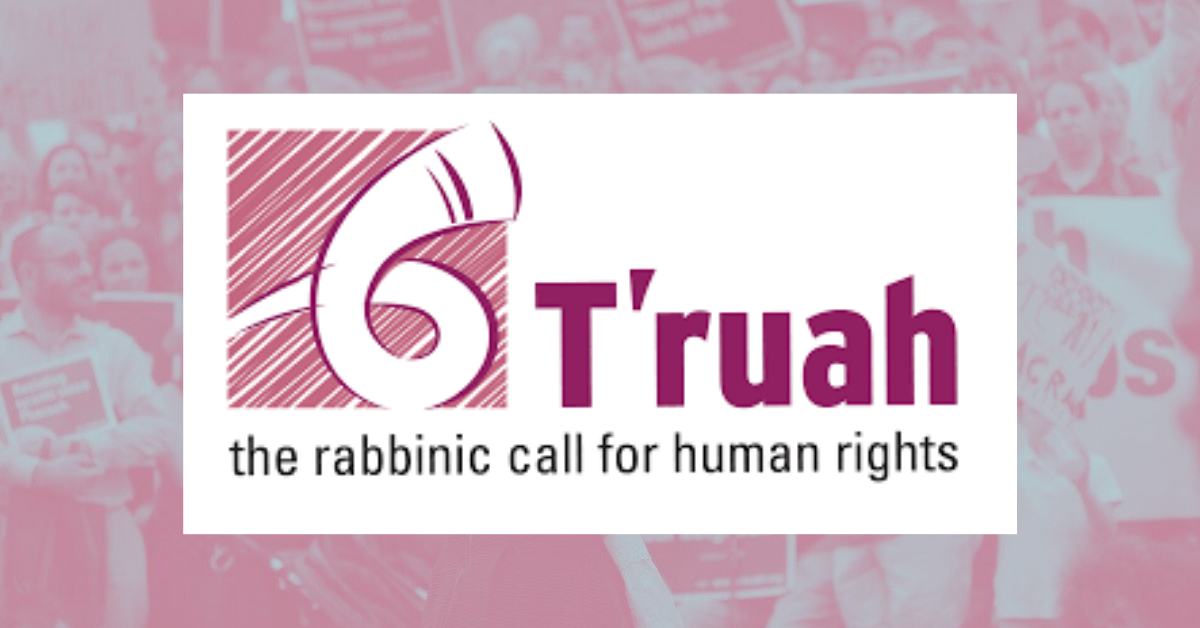COVID-19 has laid bare all the cracks in our world, all the ways in which we have failed to take care of God’s creation and of each other. Our country, and our world, stands on a foundation of injustice that maintains power and wealth for a small few, while trampling on the rights and the wellbeing of the many. Racism, sexism, classism, xenophobia, antisemitism, ableism, homophobia, transphobia, and other prejudices are built into the very fabric of our society. Violent manifestations of white supremacy have entered the mainstream, most recently with the insurrectionist riot at the U.S. Capitol, incited by the former President and actively or tacitly supported by too many Members of Congress and other leaders.
It is time to replace the systems of injustice with systems of righteousness.
God commanded the Israelites to build the Mishkan (movable sanctuary) in the desert as a microcosm of the world, crafted by human hands with the guidance of Torah and divine love. We call for building a new world together, inspired by the Mishkan, that includes:
An open doorway, screened but not gated, which served as a gathering place to conduct public business. This doorway calls us to reopen all the doors our society has slammed shut in recent years, welcoming those the outgoing administration demonized as outsiders and even rethinking on a grand scale who belongs “outside.” This work starts with rebuilding the immigration system in order to provide refugees and asylum seekers the safe haven our laws and our history promise. It includes ending immigrant detention, deportation, and family separation, as well as taking responsibility for the children left orphaned by those policies. It also means an end to mass incarceration and the establishment of a criminal legal system based on teshuvah (returning to one’s best self), that treats all people equally, regardless of race or class, and that respects the dignity and human rights of both perpetrators and victims.
The altar, where priests would offer sacrifices on behalf of the entire community. The bakers who prepared bread for the altar carried out the first labor strike recorded in Jewish text (Talmud Yoma 38a), and so the altar represents economic justice and work with dignity. This includes fair wages, pay equity, the right to unionize, safe work environments, and a robust social safety net. Additionally, today’s economic system cannot be fully just until it acknowledges and compensates for past injustices. The racial wealth gap of today rests on generations of unpaid labor and outright theft. Therefore, a world of true economic justice must include reparations for generations of racial injustice and violence against both Black and Indigenous Americans.
The washbasin, a reminder of the interconnection of all waters, represents the massive investment needed in addressing climate change, which threatens all human life but disproportionately harms the vulnerable and marginalized.
The tent covering, representing shelter, for a commitment to the health and safety of all people, including universal health care, fair housing and access to nutritious food, smart gun legislation that prevents the violence that takes too many lives, an end to state violence against predominantly BIPOC (Black, Indigenous, and People of Color) communities, and the establishment of systems that protect all of us from harm, rather than using police to protect some members of society from others.
The table for the “bread of presence,” a table for us all, for ensuring and rebuilding democracy, including an end to voter suppression, especially in communities of color; election reforms including automatic registration and universal voting by mail; ironclad privacy protections against surveillance by both government and big data companies; and a categorical rejection of hate groups and the prejudice that they spread, including white nationalism, Christian fundamentalism, Islamophobia, and antisemitism.
The menorah, representing illumination, for a renewed investment in education and science, including government policies based in facts and expertise and an equitable and well-funded school system that enables every child to become an informed and active citizen, and for a free and independent press that keeps the public informed and holds political leaders accountable.
When we build these structures of righteousness together, we will find ourselves at the parochet, the curtain before the Holy of Holies, prepared to approach the seat of God’s glory on Earth.
The Kedushat Levi (Rabbi Levi Yitzchak of Berdichev, Chasidic master, 1740-1809) wrote, “In creating the world, God left over some of the creative energy, putting a limit on Creation in order to leave room for the righteous yet to come to be creative as well… So too with the building of the Mishkan…they left room for the righteous and the wise in every generation…to continue the building and add of their own mind.” (Exodus 36:7)
We have left the depths of Mitzrayim, the narrowest of places. But liberation is not complete. Now, it is our turn to take on the divine task of building a new world of righteousness and justice.

